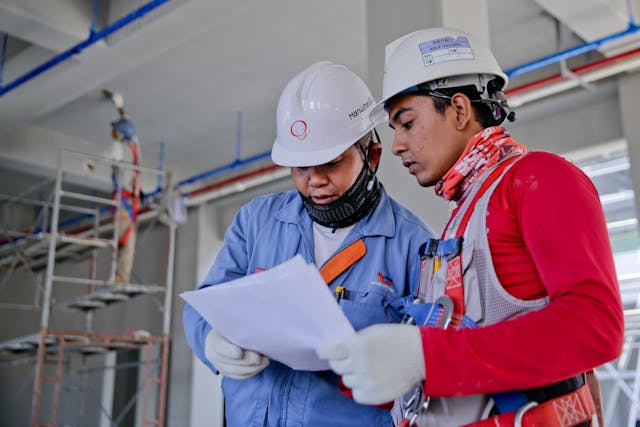Comments
- No comments found

Project managers constantly seek innovative solutions to mitigate risks and enhance efficiency in the complex and dynamic construction field.
One groundbreaking technology that has proven instrumental in this regard is telematics.
This article explores how leveraging telematics—a methodology that combines telecommunications and vehicular technologies with information and communication systems—can significantly prevent common construction project issues.
Telematics systems offer a comprehensive approach to tackling challenges, reducing delays, and improving overall project outcomes. They can optimize fleet management or ensure worker safety through real-time data and analytics.

Telematics solutions cater to the nuanced needs of the construction sector, which often involves operating in remote areas with costly equipment and a vast workforce to manage. The technology integrates GPS navigation, onboard diagnostics, and machine-to-machine communication, allowing for a seamless flow of data which is captured to inform future decisions.
Small telematics devices are often installed on construction vehicles and equipment, enabling a constant stream of data that can be accessed via a central dashboard or mobile applications. These devices can relay information such as location, usage hours, engine health, and operator performance.
Telematics platforms provide user-friendly dashboards that offer a real-time overview of the entire fleet's status. This data is not only accessible but also actionable, with the ability to generate reports that aid in predictive maintenance and overall fleet optimization.

Before exploring how telematics can mitigate these concerns, it's crucial to understand the issues that most commonly plague construction projects. These can include:
When heavy machinery fails, it can bring a project to a grinding halt. Unplanned maintenance and subsequent downtime are significant causes of construction delays.
Fuel costs make up a substantial portion of the project's operational expenses. Inefficient use or theft can lead to budget overruns.
Be they due to equipment issues, labor disputes, or weather-related factors, project delays can have cascading effects on timelines and costs.
The construction industry is high-risk, with safety lapses often leading to accidents, project disruptions, and legal implications.

Thanks to its comprehensive tracking and monitoring capabilities, Telematics emerges as a formidable tool for construction and fleet managers to tackle these issues.
Telematics systems can analyze equipment usage and performance data to predict when a machine may require maintenance, thereby allowing for scheduled servicing during opportune times.
Monitoring fuel levels and consumption patterns in real-time can detect irregularities that may signal a leak, theft, or inefficient operation, prompting immediate action.
Telematics provides insights into equipment usage patterns that can help in more accurate project scheduling and resource allocation, preventing operational bottlenecks.
Systems can be configured to provide alerts for unsafe practices, such as speeding or prolonged equipment idling, enabling managers to intervene and enforce safety protocols.

The advantages of incorporating telematics in construction management are numerous and far-reaching, impacting business profitability and project success.
Predictive maintenance, which addresses issues before they become catastrophic failures, can increase the lifespan of construction equipment.
Optimized fuel usage and reduced instances of equipment downtime contribute to lower operational costs, offering a more favorable bottom line.
Better monitoring and control over fleet operations directly translate to more efficient project execution, with real-time adjustments improving overall productivity.
Implementing telematics fosters a safety culture by identifying and addressing risky behaviors, ensuring a safer work environment.
Reduced fuel consumption and more efficient fleet management can contribute to a greener approach to construction operations, aligning with sustainability goals.

With the evolution of technology, the role of telematics in the construction industry is set to grow even more. Future trends may include:
Telematics data might increasingly be integrated with broader project management software, providing a single source of truth for all project-related data.
The advent of autonomous and semi-autonomous construction vehicles will demand even more sophisticated telematics systems to ensure proper management and oversight.
Smart sensors used to monitor additional parameters, such as environmental conditions and material quantities, will provide a more holistic view of the project site.
Telematics analytics may evolve to incorporate machine learning and AI algorithms, further enhancing the systems' predictive capabilities.
Investing in telematics will not only be about addressing current issues but also about future-proofing construction operations against new challenges and industry shifts.
Telematics is revolutionizing the construction sector through proactive and technology-driven fleet management. By leveraging the data and insights provided by telematics systems, project managers can steer clear of common pitfalls, ensure smoother operations, and deliver projects within time and budget constraints.
The wealth of benefits—from improved safety to reduced environmental impact—is compelling enough for any construction enterprise to seriously consider telematics as an integral part of its modus operandi.
With the promising trajectory of telematics technology, construction firms that seize the opportunity to integrate these systems are poised for greater efficiency, profitability, and sustainability in their projects.
Leave your comments
Post comment as a guest